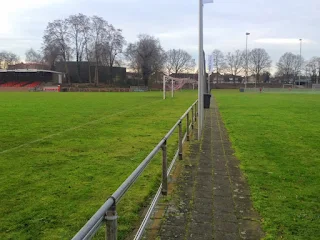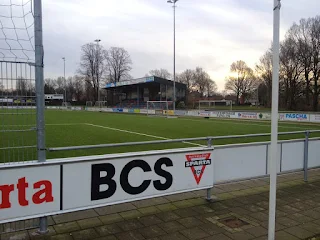Wezep Hattemerbroek Combination, or WHC Wezep as they are most commonly known are an amateur football club from from Wezep – Hattemerbroek in the Gelderland region of central Netherlands who were formed on the 1st October 1930, originally as Hattemerbroek Football Association (HVV).
HVV were
soon successful, going on to be crowned champions of the North Central Football
Association in 1937-38 and 1938-39. Unfortunately, World War Two intervened,
but when peace was restored a new club HVV Wezeper Boys took over the reins.
However, the
KNVB, the Dutch FA, refused to recognise the new set up and enforced them to
merge with another local club; HVV Brandsma. From there WHC was born. Placed in
Saturday fourth class amateur Dutch football, WHC reached the final of the
competition in 1948-49, where they were defeated 2-1 by Amsterdam AMVJ.
Undaunted
WHC regrouped and won the championship the following season by beating Nunspeet
in 't Harde in front of 5,000 fans at the final to win promotion to Derde Klasse
football. After a couple of third places in Klasse 3A before the team finished
as runners-up and then won the promotion play offs.
The 1960’s would
bring the glory days to Sportpark Muldersingel as five championships at Tweede
Klasse were won. In 1963-64 and 1965-66 the 2C title was won sandwiching a
second place in between.
The club was
moved geographically to play in Tweede Klasse 2D where WHC were just at home
with further title wins in 1966-67 and 1967-68 when an amazing crowd of 11,500
witnessed the completion of the blue and white’s seventh club title for the
final against local rivals Go Ahead Kampen Zwolle.
1969-70 saw
the 2D championship return to the club. The following season saw WHC win the
Saturday Amateur Cup following a victory over Black White '28. Throughout the
70’s WHC played in the top tier of the amateur game, fluctuating between
divisions 1A and 1B.
A runners-up
spot was achieved in 1971-72 which was followed by a series of mid table
finishes before WHC narrowly avoided relegation in 1979-80 following a 5-0 win
over SDCP, with 5,000 fans attending the clash in Nunspeet.
However, 1981-82
saw WHC relegated for the first time. Six years later victory over FC Meppel in
the final of the Tweede Klasse saw WHC propelled back to the first Eerste
Klasse for the 1988-89 campaign.
The team competed
in Klasse 1B and 1C for the following nine seasons where the team finished
third in 1992-93 prior to being crowned as champions of 1D title in 1996-97 to
take the club up to Hoofdklasse football, the highest amateur status of the day.
Probably
WHC’s greatest claim to fame came when they were drawn against Ajax in the KNVB
Cup. The match on the 23rd December 2009 was moved to the IJsseldelta Stadion
home of neighbours PEC Zwolle and ended in a 14-1 win for the visitors in front
of a sell-out 10,500 crowd.
To see the action from the game, click here.
The turn of
the millennium saw the club consolidate and then end with three third place
finishes in the league. Following restructuring of the leagues in 2010-11 WHC
failed to gain a place to the Topklasse as Hoofdklasse dropped to the second
tier.
After three
third place finishes, WHC ended as runners up of Zaterdag Hoofdklasse C in 2010-11
and 2011-12 before being relegated in 2014-15. The team recovered finishing
third in 2016-17 and again the following season from where they won promotion
through the play-offs.
However, their
Hoofdklasse stay lasted just twelve months. When the 2019-20 finished early
owing to the Coronavirus outbreak WHC sat in fourth place in Zaterdag 1E Klasse
1D.
WHC Wezep
will play in Zaterdag 1E Klasse 1D Oost in the 2020-21 season.
My visit
WHC Wezep 1 AZSV 0 (Saturday 18th January
2014) Zaterdag Hoofdklasse C (att: 300)
When I planned my long weekend around The Netherlands,
one of the attraction was that the main Eredivisie games kicked off on the
Saturday evening, offering me scope to delve into the non league amateur game
for the first time.
As my match of choice at night was PEC Zwolle against
Vitesse and to meet up with my old pal Guy Watson, who was going to FC Utrecht
v Feyenoord the following day, I wanted a nearby game. The excellent Soccerway
website was
to prove to be my friend once again.
After some trekking around Enschede and Hengelo, the train
took me to Zwolle at lunchtime. A strategic error on my part led me to book the
excellent but remote Mercure Hotel on the outskirts of the town. A decided to
splash out on a taxi from the station, but the rapid rate of the metre was
putting me off further extravagance.
Freshened up after a shower I planned to jump on the
no.100 bus at the Oranje Nassaulaan
stop. However, this required using the cycle paths going under the motorway and
dual carriageway. I got lost and had to revert to the map app on my phone.
Thankfully I’d taken up the offer from 3 phones of an unlimited twenty four
hours internet pass for a fiver. I was soon on track but time was pressing on.
I was never going to make the stop, so instead I had to jog and then run
further down the route to Katerveerdijk.
I beat the bus
by a minute. The locals saw a very out of breath and perspiring visitor jump
onboard! Around ten minutes later I was jumping off at Willem de
Zwijgerkazerne. From there it was a couple of minutes walk down Hoeloosweg to
the entrance of Sportpark Muldersingel. I was encouraged that there were
others doing the same.
I immediately got the vibes that WHC were a thriving
club. At least two other games had finished on adjoining pitches and the
women’s team were warming up before their match on the secondary pitch behind
the goal of the main arena.
I followed the crowds and found a temporary club
shop. I was delighted to see that there was a match programme. I’m not sure how
much I paid for it, as I let the friendly lady take some change from my hand,
but she gave me four strips of raffle tickets as well.
Admission cost me $7. I was given a ticket at the booth
that was then torn in half by the inspector a yard away! The entrance was in
the corner of the ground just past what looked like a decent clubhouse. Once
inside I liked what I saw. De Muldersingel was a typical non league venue.
By the entrance there was a food stall. Both ends had a
little flat hard standing. The far side had seven steps of open terracing. The
near side had similar open terracing but a raised roofed seated stand across
the half way line to accommodate 500 fans.
There was a basic scoreboard in the
far corner, but the feature that impressed me were the raised double level of
advertising boards above the open ends and terracing giving the ground a real
enclosed feel and the impression that local businesses really supported their
club.
I took up a position on the far terrace once I’d taken my
photos to take in the action. Both sides went into the game in the bottom three
in the league table, so I was expecting a tight clash. I wasn’t to be let down.
The visitors from Aalten began brightly without creating
any real opportunities. The home centre back Tanju Sahin seemed to enjoy the
theatrical side of the game. I quickly got the impression that he wasn’t quite
as good as he thought he was. The match had moments of close skill and passing,
but also plenty of long balls for good measure.
WHC grew into the encounter and
went ahead on twenty eight minutes when Bunyamin Özkök latched on to a pass
inside the area to go round the visiting custodian Ruud Kempers and slot home
from a tight angle.
Just like at being back at a game at home the away keeper
took some stick from a group of home youths. Kempers looked quite young himself
with a head of flaming red hair. I’m not sure what was repeatedly shouted at
him each time he cleared the ball, but I don’t suppose it too complimentary.
Shortly after the goal, the WHC centre forward Ibrahim Tuncer, who was built like
a young Peter Crouch missed a sitter and put the ball onto the women’s pitch
over the fence. Leading up to half time I saw fans leaving the terrace
and coming back from the food bars eating something out of paper.
This had to
be investigated! It turned out to be a lightly battered fish that was then
sprinkled with paprika pepper. It cost $2.20 and I have to say it was a very welcome treat as far as football food goes.
As the half time whistle went it was time to wash my
snack down with a beer. Bottles of Amstel were an extremely reasonable £1.75 a
go. The TV’s were showing the teletext pages from the other games around the
country, including the amateurs.
I decided to take up a seat in the stand for the second
half, finding the day so much more relaxing after finding out that the
Scarborough game at Bedworth had been postponed. Tuncer continued to have a
nightmare up front before he was mercifully replaced, while Sahin looked to be
the star while making his fair share of errors.
The action had reduced after the break, and turned into a
battle of attrition. AZSV pushed forward trying to pierce the home defence, but
they were holding firm and looking more likely to double their advantage.
Özkök
came close to claiming a brace with a decent chance. As the game entered its
closing stages I stood by the exit as Tjeerd Korf and then Rossi Dati both
missed guilt edged chances to seal the game.
I fully expected them to let it slip in the last minute.
Judging from the reaction of their fans, I wasn't in a minority. However, they
hung on to claim three vital points. I thought it only right to have another
bottle while waiting for my bus.
The bar was packed with happy fans who then
turned their attention to the TVs showing the Holland v New Zealand hockey
match. My timing was perfect, having only to wait a minute or
two for the bus to arrive and take me to Zwolle station and to meet up with Guy
for the evening’s entertainment.



































































